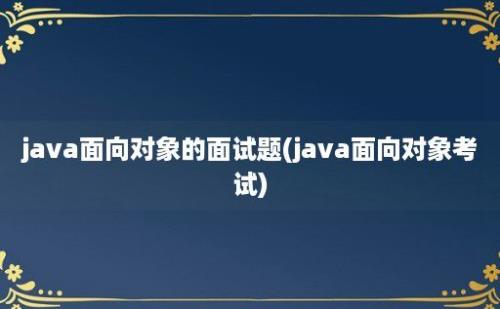java面向对象的面试题(java面向对象考试)
导语:JAVAEE 面向对象面试复习题

class Test {
public static void main(String[] args) {
String foo = args[1];
String bar = args[2];
String baz = args[3];
}
}
d:\>java Test Red Green Blue
what is the value of baz?
A. baz has value of &34;
B. baz has value of null
C. baz has value of &34;
D. baz has value of &34;
E. baz has value of &34;
F. the code does not compile
G. the program throw an exception
接口选择题:1)下面关于接口的说法中不正确的是(A C)。
A.接口中所有的方法都是抽象的 错
B.接口中所有的方法都是public访问权限
C.子接口继承父接口所用的关键字是implements
D.接口是Java中的特殊类,包含常量和抽象方法
2)Java语言接口间的继承关系是( )。一个接口可以继承多个接口。
A.单继承 B.多重继承 C.不能继承 D.不一定
3)一个类实现接口的情况是(A)。
A.一次可以实现多个接口 B.一次只能实现一个接口
C.不能实现接口 D.不一定
填空题1)_____是声明接口的关键字,可以把它看成一个特殊类。接口中的数据成员默认的修饰符是_____,接口中的成员方法默认的修饰符是_____。
2)实现接口的实现类,必须重写接口中的所有________方法。
abstract class 和interface 有什么区别?从构造方法、成员变量、成员方法来区别;
再从子类、实现类做区别; 答案比较完善;
是否能通过编译?interface A{
int x = 0;
}
class B{
int x =1;
}
class C extends B implements A {
public void pX(){
System.out.println(x); //super.x A.x
}
public static void main(String[] args) {
new C().pX();
}
}
不可以,x有冲突;
Reference to &39; is ambiguous, both &39; and &39; match
写出程序结果interface A{}
class B implements A{
public String func(){
return &34;;
}
}
public class Demo{
public static void main(String[] args){
A a=new B();
System.out.println(a.func());
}
}
不能编译;
是否有误?
是否可以通过编译?abstract class Something {
private abstract String doSomething ();
}
是否可以从一个static方法内部发出对非static方法的调用?编译是否通过?public class Something {
public static void main(String[] args) {
Something s = new Something();
System.out.println(&34; + doSomething());
}
public String doSomething() {
return &34;;
}
}
静态方法调用实例方法的时候,需要声明实例,然后格式是实例.方法名;
方法前面有static关键字,调用格式可以类名.方法名,也可以是实例.方法名。
谈谈final, finally, finalize的区别(面试)final:用来修饰常量(成员变量),需要被赋值,不可重复赋值。
final用来修饰方法,如果有子类继承自该来,则子类不能够重写被final修饰的方法。
finally:用来在try块里面。try+finally,也可以try+catch+finally格式;
finalize:?Object类中有finalize()方法,用来清理垃圾,垃圾回收期。
public class Something {
public int addOne(final int x) {
return ++x;
}
}
如下程序是否可通过编译?public class Something {
public static void main(String[] args) {
Other o = new Other();
new Something().addOne(o);
}
public void addOne(final Other o) {
o.i++;
}
}
class Other {
public int i;
}
是否可以通过编译?class Something {
int i; //成员变量 ,有默认初始值;为0
public void doSomething() {
System.out.println(&34; + i);
}
}
是否可以通过编译?接上题
class Something {
final int i;
public void doSomething() {
System.out.println(&34; + i);
}
}
以下代码的运行结果是?public class Test {
static int x, y, z;
static {
int x = 5;
x--;
}
static {
x--;
}
public static void main(String[] args) {
System.out.println(&34; + x);
}
}
本文内容由小萱整理编辑!